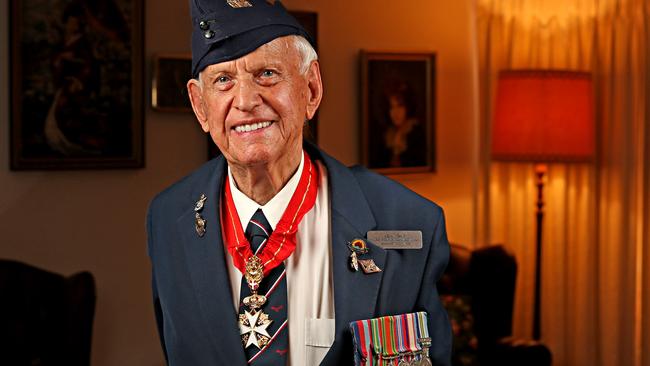Bombing of Darwin 75th anniversary: Alan Day recall experience in war-hit Top End
“IT was an extremely hot place.” At 95, Alan Day proves himself to still be a master of understatement as he peers back three quarters of a century, to his life as a medical orderly in the Top End

Bombing of Darwin
Don't miss out on the headlines from Bombing of Darwin. Followed categories will be added to My News.
“IT was an extremely hot place.” At 95-years-old, Alan Day proves himself to still be a master of understatement as he peers back three quarters of a century, to his life as a medical orderly in the Territory’s sweltering Top End.
Unlike many of his counterparts, he has survived to tell this tale — a story of restless movement and hardship — yet one also peppered with moments of youthful exuberance and cheeky fun.
“I was just a young lad of 19 in those days and all the girls were looking at me,” he reflects with a twinkle.
“They don’t look at me much now, unfortunately. Some of them do when I get my seven war medals on and get all dressed up, you know.
“They tend to give you a bit of a glance.”
Alan enlisted into the army as soon as he was of age, as a young buck of 18.
He was swiftly drafted to Darwin, up to the steamy north Australian capital; with its raucous Chinatown, boggy roads and wartime camaraderie.
The adventures, while constant, weren’t always as romantic as many of the young men like Alan had imagined — fear gripped the tropics in 1941-1942 as Japanese air raids whistled overhead on a regular basis.
“It was quite scary at that time. We were only young men, and getting bombed regularly,” he says.
“You could count on the Japanese coming over during the moon period.
“The full moon would last two or three days, and they would always come over then, because they could pick out the sites they wanted to bomb.
“The site would be clearer for them.”
Fresh from the near obliteration of Pearl Harbor in Hawaii, the Japanese air force was at the peak of its deadly strength.
Alan and his comrades would see the full moon rising. They knew what lay ahead.
Now, three quarters of a century later, Alan wants younger generations to realise the deep significance of what he and his peers withstood — and what they accomplished in helping protect Australian soil.
“It’s important, particularly for the younger generation ... because sadly they’re not being taught in some of the schools about what happened during that period, and it’s important for the young ones to know.”
Now living close to family members in Mornington, Victoria — where he still enjoys the odd game of golf, assists in distributing educational war pamphlets and poses for the occasional press photo — Alan looks back at his days in Darwin with mixed emotions.
“It means a tremendous amount in a lot of ways,” he says.
“It’s good to live a long age like me, you know, I’m 95. But there’s a lot of sadness connected with it, with memories of what happened ... in Darwin.
“And also, of course, losing quite a number of good mates since that time ... this is the type of sadness that is around you.
“But you’ve got to highlight in your mind that you’re really thankful in your mind to be healthy, at 95 years of age.
“You’ve got to be grateful.”
Originally published as Bombing of Darwin 75th anniversary: Alan Day recall experience in war-hit Top End


